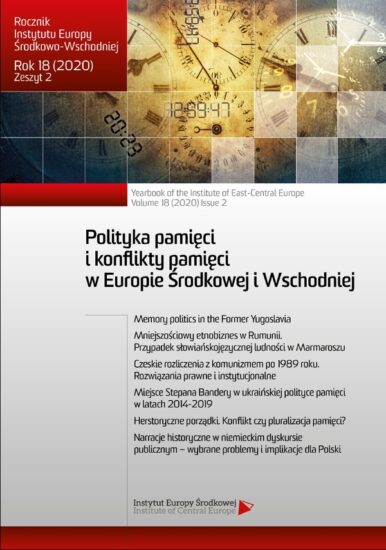Pages: 85-101
Edition: Lublin 2020
DOI: https://doi.org/10.36874/RIESW.2020.2.4
Citation method: Karol Kujawa, Polityka historyczna Partii Akcji Demokratycznej w Bośni i Hercegowinie na przełomie XX i XXI wieku – zarys problemu,„Rocznik Instytutu Europy Środkowo-Wschodniej” 18(2020), z. 2, s. 85-101, DOI: https://doi.org/10.36874/RIESW.2020.2.4.
Keywords: Bosnia and Herzegovina, Muslims, political history
Abstract:
The aim of this paper is to make an overarching evaluation by looking at historical policy of the Party of Democratic Action (Stranka demokratske akcije, SDA) in Bosnia and Herzegowina at the turn of the 20th and 21st century and trying to (analytically) examine the main directions of this policy. Therefore paper will try to focus on the major historical figures and trying to analytically to indicate the reasons of the revival the Ottoman traditions in the public life of Bosnia and Herzegovina. Considering this issue I wonder what events and historical figures were promoted and which were censored by Bosnian politicians. What role in Bosnian historical politics was played by Srebrenica and the leader of Bosnian Muslims, Alija Izetbegović. The results of these studies indicate that it was primarily the conflict in Yugoslavia that contributed to the revival of Ottoman traditions among Bosnian Muslims. Only after the war did the historical policy gain institutional support and help the ruling party mobilize the electorate. Since then, the pillar of historical policy
has become the martyrdom of the nation, the Ottoman past as well as the cult of the leader of Bosnian Muslims, Alija Izetbegović. Also, the authorities aimed to convince the inhabitants of Bosnia that in their lives the period of communist Yugoslavia brought many negative consequences. This pejorative image was supported in the mass media and education.
Bibliography:
Andjelić N., Bosnia-Herzegovina: The End of a Legacy, London 2003.
Behmen O, The Young Muslims 1939-2000, Sarajevo 2000.
Bišćević H., Abdicev put u izdaju, Ankara 1993.
Buturović A., M. Pargan, B. Buljubašić, Alija i Tito: „Kovači” protiv „kuće cvijeća”, „Slobodna Bosna”, 20.10.2005, s. 6-9.
Čolaković E., Iz Bosne o Bosni, Zagreb 1991.
Čolaković E., Izabrane pjesme, Zagreb 1990.
Čolaković E., Legenda o Ali-paši, Sarajevo 1991.
Dani Ajvatovice, „Ljiljan”, listopad 1999, nr 511, s. 13.
Dejton koči dalji razvoj BiH, „Osobođenje”, 29.09.2004, nr 20.711, s. 6.
Ef. Cerić: Imami – šehidi pokazali su da nismo kukavice koje su spremne prodati dušu, „Dnevni list”, nr 334, s. 3.
Elsie R., A dictionary of Albanian religion, mythology and folk culture, New York 2000.
Fazlagić A., Najmarkantnija politička ličnost BiH krajem 20. vjeka, „Mozaik. Omladinski časopis”, sierpień 2004, nr 17, s. 13-20.
Gałkowska A., Gałkowski S., Polityka historyczna – o bezużyteczności pojęcia, [w:] Państwo i społeczeństwo, red. S. Kilian , Kraków 2008, s. 51-58.
Hadžović S., Sastavni dio ciljeva rata protiv BiH – genocid i etničko čiśćenje, [w:] Ratovi u Jugoslaviji 1991-1999, red. R. Ratković, Beograd 2002, s. 265-273.
Ilić A., Nas dedo Alija, Sarajevo 2000.
Kamberović H., Husein-kapetan Gradaščević (1802-1834): Biografija: uz dvjestu godišnjicu rođenja, Gradačac 2002.
Kujawa K., Wątki panislamskie w myśli politycznej „Młodych Muzułmanów”, [w:] Bałkany w oczach młodego człowieka, red. I. Petrov, Łódź 2006, s. 139-145.
Lopašić R., Bihać i Bihaćka krajina, Zagreb 1943.
Magaš B., Žanić I., Rat u Hrvatskoj i Bosni i Hercegovini 1991-1995, Zagreb 1999.
Matvejevitch P., L’Ex-Yougoslavie: Les Seigneurs de la Guerre. Milosevic, Tudjman, Karadzic, Mladic, Seselj, Arkan, Susak et les autres, Paris 1999.
Muharem Omerdić o ramazanskom programu, Iz Javnog RTV sistema nisu nam obećali ni servisnu informaciju, „Dnevni Avaz”, 30.09.2004, nr 3223, s. 5.
„Mozaik. Omladinski časopis”, sierpień 2004, nr 17, s. 3.
Orahovać S., Stare narodne pjesme muslimana Bosne i Hercegovine, Sarajevo 1997.
Razgovor sa Nijazom Durakovicem, „Slobodna Bosna”, ” 23.08.2004, nr 456.
SDA i izbori, „Ljiljan”, styczeń 1999, nr 510, s. 10.
Spomen-soba Aliji Izetbegoviću bit će u kuli iz 16. stoljeća, „Dnevni Avaz”, 30.09.2004, nr 3223, s. 3.
Zapis o zemlji [dokument dźwiękowy], Ratno predsjedništvo općine Tešanj, 1992 [taśma magnet.].
Žanić I., Flag on the Mountain. A Political Anthropology of War in Croatia and Bosnia-Herzegovina 1990-1995, London 2007.

PDF: Download